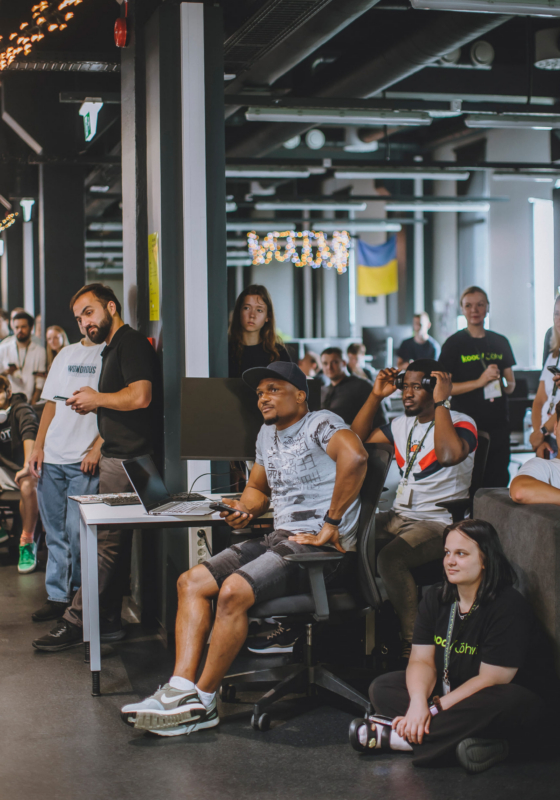Curriculum
Curriculum
Programming Education for Adults.
Curriculum Group Title
Software and Application Development and Analysis.
Objective
The educational programme trains full-stack developers. Graduates of the programme will acquire practical skills and knowledge to take up a position as a software developer or other technical position.
Target Group and Conditions for Starting Education
The student must be 18 years old, have previously acquired a basic education, must have an intermediate level of English proficiency and passed an online test that assesses logical thinking and problem-solving skills. No prior knowledge of programming is required.
Learning Outcomes
Completion of the study program takes place on a new self-learning platform that has been developed to support the peer-to-peer learning method since 2023. The platform includes an automated application process, customizable tests, a gamified progress tracking system, and modules that allow learners to deepen into different programming languages and technologies.
While participating in the study program, the learner:
- writes program code in various programming languages, including Java and Javascript;
- designs the product and its architectural solutions;
- implements, installs and tests solutions;
- participates in software development both independently and in teams.
Selection Sprint (156 academic hours, including 112 academic hours of classroom and practical work)
The Selection Sprint is an intensive test period for delving into the fundamentals of programming and development environments, consisting of two weeks on-site and one week of remote work. This stage creates a strong foundation and helps assess whether candidates have the necessary intelligence and independence to succeed in an independent and self-directed learning environment. Candidates gradually hone their skills through short, automatically graded exercises, while exams at the end of the first and second weeks help monitor progress. Weekends are dedicated to teamwork and solving more complex problems, during which cooperation and creative thinking develop.
Throughout the process, Selection Sprint participants are guaranteed support from team members and technical tutors. Their role is to guide and support candidates in the process, helping them develop independence and problem-solving skills. The goal of coaching is to encourage candidates to find solutions independently and creatively by offering guiding questions and hints without giving direct answers. It is important to help candidates understand the objectives of the tasks and analyze different solutions. Team members and tutors also play an important role in reflecting on learning, providing constructive feedback that focuses on skill development and strengthening the learning process. During the weekend team work, collaboration is encouraged by guiding candidates to share ideas, listen to each other and solve complex problems together. Maintaining a positive learning environment and supporting motivation helps candidates maintain a positive attitude and persistence even in the face of difficult challenges. The guidance of team members and technical tutors plays an important role in the development of candidates, helping them to grow into independent and creative learners who are ready to successfully enter the next stage in the study program.
Full-Stack Foundation (1144 academic hours, including 40 academic hours of classroom and practical work)
The core program consists of two modules, which are fundamentals of programming (234 academic hours) and application development (910 academic hours). When completing the basic program, the learners’ progress is supported through various activities, where professionals in their field share their experiences in kood/Talk, kood/CodeReview or kood/Workshop formats. Various workshops and activities supporting career choices such as a mock interviews organized.
- The Fundamentals of Coding begin after the Selection Sprint. The first week of the course is devoted to consolidating programming skills and delving deeper into the Java programming language. From there, learners begin solving real-life problems through projects, each lasting 2-3 weeks. Integration and processing of data from different file formats, visualization on web platforms and creation of CRUD-based APIs to interact with databases.
- In Application Development, learners immerse themselves in the creation of a full-length web project tailored to specific user profiles. This module starts with a 2-week intensive JavaScript sprint. Etap’s tasks include the development of complex web-based systems that include real-time data exchange, user-to-user communication, and third-party integration capabilities. These systems may include both synchronous and asynchronous communication, multi-layer computing, user interface components, and various technical solutions for scalability and performance. The tasks also require ensuring security, user rights management and data integrity.
Specialisation modules
The duration of these modules varies (520-832 academic hours, including 18 academic hours of classroom and practical work) and they offer an opportunity for focused learning in a narrow technical field. Specialization is in the following fields (eng k):
- Advanced Full Stack (650 academic hours, including 18 academic hours of classroom and practical work)
- Cybersecurity (598 academic hours, including 18 academic hours of classroom and practical work)
- DevOps, Cloud & System Administration (520 academic hours, including 18 academic hours of classroom and practical work)
- Embedded Systems (832 academic hours, including 18 academic hours of classroom and practical work)
- Generative AI (650 academic hours, including 18 academic hours of classroom and practical work)
- Mobile App Development (520 academic hours, including 18 academic hours of classroom and practical work)
Deep Dives (2-4 weeks)
In-depth modules offer learners the opportunity to delve into specific areas of technology. They develop broad-based skills and improve learners’ competitiveness on the labor market. Elective modules are: Database Technologies, Software Testing, APIs and Intersystem Communication, Web Application Security, Advanced Git.
Description of the Learning Process
The curriculum is based on OÜ FutureCoders computer program using self-study methodology. The educational software used in the curriculum includes additional instructions and a built-in mechanism that teaches programming from scratch. Learning takes place in modern collaborative areas, where students are provided with the necessary tools for learning. Learning consists of solving practical tasks, 80% of which are teamwork in cooperation with other learners and 20% independently.
The duration of the study process is 12 months as standard. Since the study is based on self-study methodology and it is possible to choose the pace of study, it is possible to complete the program faster. The entire learning process takes place as practical and independent and team work, which is supported by additional activities.
The learning platform provides learners with programming tasks with an expected outcome and instructions they need to program. The program is structured in such a way that for some tasks learners must use predetermined technologies (including programming languages, frameworks, databases or libraries), but for others they can choose a suitable technical solution themselves. The explanations for the assignments are in English, and they are also helped by tutors and fellow students if necessary.
At the beginning of the study process, students are supported during the first month through a mentoring program that helps them settle into the study. There are independent study groups and conversations with learners to support each other, discuss assignments and work together to complete the program. The main program also includes various workshops in cooperation with partners, meetings with professionals in their field, job shadowing and other events that support career choice.
Assessment
Learning outcomes are evaluated during the admission period through exams that take place at the end of the first and second week. Their results provide a clear overview of the candidates’ ability, development and readiness.
When completing the study program, the learning results are evaluated on an ongoing basis both through the control modules built into the learning platform, which check the reliability of the program code written by the learner, as well as by the tutors and fellow students themselves, based on the evaluation guidelines.
The quality of the students work is sufficient if the created solution works according to the purpose of the task and the instructions. For a working solution, the learner receives the points assigned to the task. You don’t get points for a solution that doesn’t work, and you can move on to the next task only after reaching the correct solution.
Issued Documents
- Students who have completed the Full-Stack Foundation will be issued a certificate.
- Students who have completed the Full-Stack Mastery (Full-Stack Foundation + one Specialisation Module) will be issued a certificate.
- Students who have completed specialisation modules will be issued a certificate.
Learning environment
Teaching takes place in the learning building: Zhytomyr Polytechnic State University. The school allows students, if necessary, the tools necessary for their studies (laptop). Students have the opportunity to live in a dormitory next to the university. Each room comes with a bed, mattress, and basic furniture (e.g., wardrobe, table, chair, shelves). There are also shared shower and toilet facilities in the dormitory.
A place in a dormitory costs 175 UAH per night.
The learner has the opportunity to complete the study program in the distance learning format, but this requires adherence to deadlines and willingness to participate in events organized in the study building.
Admission and Dismissal Conditions
Upon entering the school, the learner signs a learner’s contract with the school, which:
- The school is obliged to provide the learner with access and support in the self-study program, top-level programming education, enable development as a specialist in the ICT field, and support the learner’s career.
- The learner is required to develop his IT and software development skills, participate in the process of learning to become an IT specialist, and aim to be a full-fledged member of the kood/Zhytomyr continuing education institution and community.
Quality Assurance Conditions
To ensure the continuous development of learners and the quality of learning materials, we work together with other schools with a similar methodology as well as partner companies. To keep our curriculum globally relevant, we are constantly adding and improving our curriculum. This means we can add, update or remove modules, topics and assignments, with the aim of equipping learners with the skills and experience they need to secure their next role when entering the technology sector.
In order to ensure student satisfaction, //kood collects the NPS metric (Net promoter score) at that time as written feedback from students on a scale of 0-10. In addition to this, there are questions that reveal the background of the assessment. The same feedback is collected at the end of each test period and Selection Sprint. The information obtained from the feedback is directly used to improve both teaching and school life.





